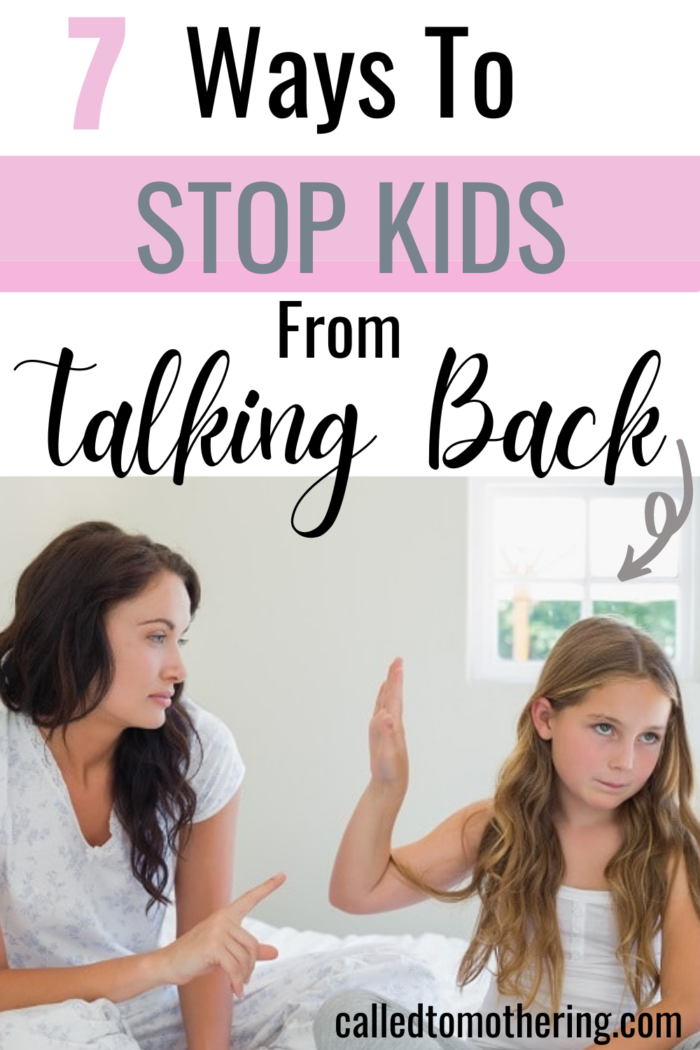
“Do I have to?”
“I’m busy right now.”
“You can’t make me!”
You’ve probably heard at least one of these phrases come out of your kids’ mouths at some point. Talking back is probably one of the most common- and most tricky- problem behaviors to handle.
“Backtalk” is a broad term that refers to a whole host of disrespectful responses from children. Depending on the age of the child, it can range from a toddler’s defiant “NO,” to eye rolling, to a full-blown shouting match.
Why Kids Talk Back
There are a variety of reasons why kids talk back to their parents. First, they may just be testing their own power to see how far they can take it. Young kids often push the boundaries mom and dad have set in order to discover where they really are.
Children may also feel disrespected by parents who overprotect or boss them around.
Many times, kids talk back in an attempt to express powerful emotions. They’re trying to communicate anger, frustration or hurt, although it’s in a way that isn’t productive.
Talking back guarantees you’ll pay attention, and negative attention is better than none. These outbursts and other types of behavior issues are more common during times of transition, such as a new baby in the house, change in a parent’s work schedule, or something going on in school.
Children have a desire to feel heard, too, which is part of a normal progression towards independence. We all want the ability to have some control over our lives, and our kids are no different!
When they can’t get it because we’re either ordering them around or doing everything for them, they lash out with words.

Is all back talk disrespectful?
Sometimes backtalk is subtle, and other times it feels like a slap in the face.
Frequently, our children’s responses to our requests are simply answers that show their growing need for independence. They don’t agree with something we’ve said or asked, and they want to assert their opinion.
But other times, it is rude and defiant behavior that must be addressed.
The Way to Distinguish between Sass and Legitimate Responses
At times I interpret my children’s desire to express themselves as refusal to do what I’ve asked. I want them to do what I want them to do exactly right then with no hesitation. Hesitation = disobedience.
That said, I’ve seen my error time and again when they show they’re just wanting more clarification for the task. My daughter has sometimes genuinely seemed confused about instruction, scared about execution, or was nervous and needed more information.
To determine if the backtalk you’re experiencing is something that needs to be corrected, apply this litmus test question: ”Would it be okay for my child to respond in the same way in front of my friends, co-workers or in-laws”?
If the answer is “no”, that indicates you have to be proactive in correcting the backtalk.
How To Stop Back Talking
Here are some effective and practical things you can do to stop your kids from responding rudely.
1. Teach polite ways to express opinions.
When things are calm, teach your child an appropriate way to respond that isn’t disrespectful. For example, they might say “Can I do it after I’m done with ________?” “No” or “whatever” is not an appropriate response.
Ephesians 4:29 says, “Don’t use foul or abusive language. Let everything you say be good and helpful, so that your words will be an encouragement to those who hear them.”
Be sure to emphasize the message that you won’t listen to what your children have to say until they’re able to speak to you in a calm and respectful manner!

One thing your kids could do if they take issue with a request, is ask permission to “disagree respectfully”. That way, you don’t mistake their reply for defiance.
Then, you can decide whether they have a legitimate reason for doing it differently or at another time. Your son may still end up needing to do what you’ve asked, but at least he got his point across respectfully and was given a chance to be heard.
And make sure that when your children communicate properly, you reward their behavior with a hug, a thank you, or a compliment.
2. Set a good example.
So much of our kids’ speech reflects our own- the way we talk to our husbands, our friends, even how we talk to them. It’s important to monitor your own language and model respect! They are little sponges, soaking up the examples we’ve put in front of them.
Many tv shows and movies depict children talking back to adults and often displaying sarcasm and a sassy attitude. While that may be good for comedy, kids need to know that imitating that type of behavior is not funny— or acceptable— in real life.
One way to see what your kids are exposed to is watch what they watch so you can talk about what they’re seeing on screen.
3. Don’t talk back to them.
It’s tempting when your kid replies rudely to be rude or sarcastic back. You may want to respond to a 5-year-old who declares, “You’re not the boss of me!” with a quick, “Actually, I am!”
However, this results in an argument and eventually, a power struggle.
Remain calm and remind them of an acceptable reply instead. When you ask your daughter to do her math homework and she screams, “You can’t make me!” don’t slam your hand onto the table.
Rather, quip: “Hold on there, sister. Do you think that when you yell at me like that, I’m going to say, ‘Okay, you don’t have to do it?’ Or do you think there might be a better way to talk to me to get what you want?”
If you don’t want your child to learn that trading barbs or getting into a war of words are good ways to handle conflict, then don’t respond until you can speak in a controlled manner.

4. Phrase your request appropriately.
Make sure that you’ve actually phrased your request as a command, instead of as a question. For example, say “Please clean up your room” instead of “Will you clean your room?”
Many times, I’ve posed requests to my children the second way and they thought they had the option of whether or not to do it. God has given you the authority as a parent to give directives to your children.
Just don’t barrage them with a bunch of these imperatives at one time! This eventually leads to exasperating your kids, which Ephesians 6:4 warns against.
5. Give them some control.
Find opportunities for your kids to assume some control of their own world. For a toddler, this could mean picking her own outfit. For a preteen, this can look like planning an activity for a family outing.
The truth is, when children’s need for power isn’t met, they will exert it in all sorts of ways: prolonging bedtime, refusing to cooperate during the morning routine, or talking back.
In each of these situations, kids have legitimate power– we can’t FORCE them to eat their broccoli. We can’t FORCE them to lie in their bed. We can’t FORCE them to pick up the pace in the morning.
And, as much as we wish otherwise, we have no control over what comes out of their mouths.

6. Spend quality time with them.
One of the reasons kids mouth off is because they don’t feel connected or secure. Children ultimately don’t rebel against rules; they rebel against a lack of relationship.
Make a point of engaging each child in one-on-one time. This helps build strong relationships between you, and also opens up natural opportunities for good communication.
I’ve found that if my kids are getting cranky in their responses to me, they need a refilling of their love tanks. So I’ll put the phone aside, close the laptop, and give them my full, undivided attention for a few hours.
It works wonders for changing behavior!
7. Enforce consequences.
Overlooking disrespectful behavior can often encourage more of the same, so you have to stand firm when your kids sass you or use unkind words.
Be sure to communicate the consequences of backtalk ahead of time. By knowing upfront what it will cost, kids can see how avoiding it is beneficial to them.
Consider adding extra chores, or losing TV or computer time. When enforcing the consequence, remind your child of the link between it and the backtalk— “When you choose to speak to me like that, you don’t get to go on the playdate.”
Don’t waffle; following through is hard but it’s the only way kids know you’re serious.

Backtalk is extremely frustrating, but with the right tools, you can diffuse it in no time! Don’t be surprised, however, if once you get backtalk under control you start seeing other issues flare up.
That’s why I’ve created an entire parenting course– to help moms with ALL of the struggles with their children, not just one.
You’ll get even more tools to nurture a loving parent-child relationship that will last into the teenage years and beyond!


Leave a Reply
You must be logged in to post a comment.